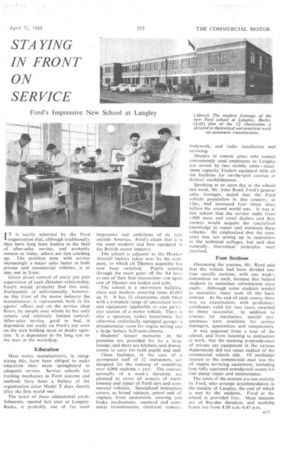STAYING IN FRONT ON SEI?VICE
Page 47

If you've noticed an error in this article please click here to report it so we can fix it.
Ford's Impressive New School at Langley
TT is tacitly admitted by the Ford
organization that, although traditionally they have long been leaders in the field of after-sales service, and probably remain so today, others are fast catching up. The problem now, with service increasingly a major sales factor in both private and commercial vehicles, is to stay out in front.
Given direct control of every job plus supervision of each distomer-relationship, Ford's would probably find this easy. Fortunately or unfortunately, however, on this front of the motor industry the manufacturer is represented, both in his agents' offices and on the service shop floors, by people over whom he has only remote and relatively limited control. After-sales service, good or bad, is dependent not really on Ford's nor even on the men holding main or dealer agencies. It is dependent in the long run on the men in the workshop.
Education
Most motor manufacturers, in recognizing this, have been obliged to make education their main springboard to adequate service. Service schools for training mechanics in Ford systems and methods have been a feature of the organization since Model T days shortly after the first world war.
The latest of these educational establishments, opened last year at Langley. Bucks, is probably one of the most impressive and ambitious of its typ..": outside America. Ford's claim that it is the most modern and best equipped in the British motor industry.
The school is adjacent to the Hawker Aircraft factory taken over by the company, to which all Thames assembly has now been switched. Pupils coming through the main gates off the A4 have as one of their first impressions row upon row of Thames van bodies and cabs.
The school is a two-storey building, clean and modern, covering some 42.00n sq. ft. It has 12 classrooms, each fitted with a complete range of specialized tools and equipment applicable to one particular section of a motor vehicle. There is also a spacious, rather luxuriously hut otherwise realistically equipped garage; a dynamometer room for engine testing and a large lecture hall-cum-cinema.
Students' leisure moments on the premises are provided for by a large lounge, and there are kitchens and diningrooms to cater for both pupils and staff.
These facilities, in the care of a permanent staff of 12 instructors, are designed for the training of something over 4,000 students a year. The courses. normally of a week's duration, are planned to cover all aspects of maintenance and repair of Ford cars and commercial vehicles. Specialized instruction covers, as broad subjects, petrol and oil engines, front suspension, steering and brake mechanisms, standard and automatic transmissions, electrical systems. bodywork, and radio installation and servicing.
Dealers in remote areas who cannot conveniently send employees to Langley are served by two mobile units—maximum capacity Traders equipped with all the facilities for on-the-spot courses at dealers' establishments.
Speaking at an open day at the school last week, Mr. John Read, Ford's general sales manager, stated that the Ford vehicle population in this country, at l+m., had increased four times since before the second world war. It was at this school that the service staffs from 1.900 main and retail dealers and fleet owners would acquire the specialized knowledge to repair and maintain these vehicles. He emphasized that the company was not setting up in opposition to the technical colleges, but said that naturally, theoretical principles were involved.
Four Sections
Discussing the courses, Mr. Read said that the vehicle had been divided into four specific sections, with one week's instruction on each, because this helped students to assimilate information most easily. Although some students tended to specialize, many took all the basic courses. At the end of each course there was an examination, with proficienc■. certificates valid for two years awarded to those successful. In addition to courses for mechanics, special prospectuses ",vere available for service managers, apprentices and receptionists.
It was apparent from a tour of the school, and from listening to instructors at work, that the seeming preponderance of private car equipment in the various departments did not mean neglect of the commercial vehicle side. Of particular interest to the commercial man was the oil engine servicing equipment, including four fully equipped soundproof rooms for fuel pump repair and maintenance.
The costs of the courses are met entirely by Ford, who arrange accommodation in the locality of Langley, the cost of which is met by the students. Food at the school is provided free. Most sessions are of five-day duration, and working hours are from 8.30 a.m.-4.45 p.m.




















































































































